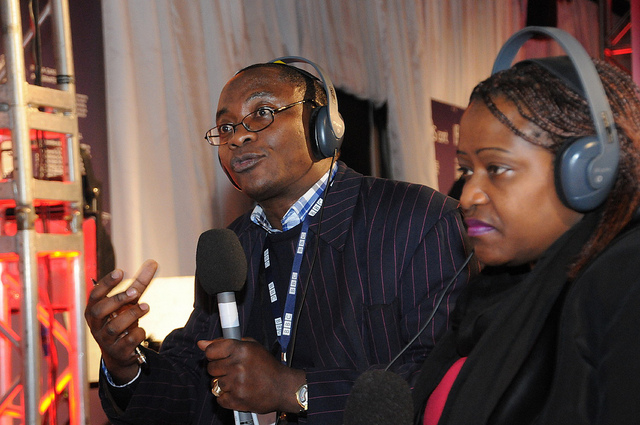Send to a friend
The details you provide on this page will not be used to send unsolicited email, and will not be sold to a 3rd party. See privacy policy.
A SciDev.Net survey reveals the challenges of applying research insights to policy and practice, and underscores that evidence is not enough.
A couple of weeks ago, I was speaking to a funder from a major philanthropic organisation at the Open Up! conference on international development in London. We acknowledged that philanthropists should be in a position to take more risks, such as funding creative projects that might deliver development outcomes in unexpected ways, because unlike government aid agencies they are not accountable to a nation of taxpayers.
But this colleague said that what a private funder really wants is a balanced portfolio: some projects could be a bit risky, but not all of them should be. And he said that even unconventional projects need to offer convincing evidence about their potential value.
This exchange demonstrates simply the value of carrying out research before making strategic choices — it helps to manage risks. But a new study by SciDev.Net makes clear that the steps from research to decision-making are far from straightforward: they can be fraught with misunderstandings about what makes research relevant to policy and development outcomes.
Science–policy gulf
The study also informs our strategic review for the next five years of SciDev.Net's work, and decisions about how to invest our valuable resources. We have spoken to more than 3,500 scientists, funders of science, users of science and reporters of science around the world to explore the challenges of applying scientific research to policy and practice for poverty reduction and equitable, sustainable development.
Being efficient involves understanding how to do things better; being effective is knowing the right thing to do in the first place. The research that underpins our strategic review is focused on the latter: understanding the relationship between science and global development rather than fine-tuning what we do internally.
Among the insights emerging from the findings, published today, are several that are particularly significant for organisations that, like SciDev.Net, are concerned with the capacity of science to make a difference to the lives of poor people.
One is that science has implications for public policy across a range of issues — in any given year, there is unlikely to be a Millennium Development Goal that might not benefit from some technological innovation or scientific insight.
It is interesting, then, to learn that more than 70 per cent of the development agencies we spoke to said they seldom read about advances in science or technology. Is this because they think of science as something to be read by scientists, a professional group well removed from themselves and their peers?
Science and technology generally fall under the same ministerial brief for higher education in many governments globally. This makes sense in the context of planning for better science capacity, but may also explain the professional segregation.
Communication breakdown
Indeed, at the largest conferences on international development, the language of the scientific method is everywhere — people speak of evidence, pilots and results. But you would be hard pressed to find scientists themselves in these spaces speaking about research or technological innovation.
Our findings suggest reasons why this might be the case.
Many of our readers around the world complain of a lack of sources for information and discussion. Also, resistance and censorship among the scientific community are major global issues: nearly 60 per cent of respondents feel that the research community is "reluctant to share detailed information or to provide conclusions and recommendations based on research results".
In particular, nearly half of respondents in the media sector do not feel positive about access to scientists or academics as sources of information, or about access to information from government agencies on issues relating to science.
Where scientific information might make it into the media, both journalists and their audiences do not always feel confident about how the information is being handled. Good journalism requires a particular set of skills, and demand for training among our media respondents in some regions is as high as 70 per cent.
Less surprisingly, more than half of media respondents complain about the difficulty of finding scientists and tech enthusiasts who can speak in a way that is understandable to a lay audience.
The language of development
The challenge of communication is not as straightforward as it would first appear. We assume that being understandable is just about using less jargon. But the point is, it matters whose jargon is used.
To be effective, we need to ensure that news about science and technology resonates clearly with the concerns and language of those who should apply it in their work. This is not just about understanding the preoccupations that define the professions 'downstream' of science, it is also about acknowledging the values that shape key relationships in any policy sphere.
Our research shows that the largest challenge to applying research insights to policy and practice is a lack of socio-economic analysis and explanation of the implications. In addition, respondents feel that financial interests tend to dominate most public policy-making processes — and this is not generally reflected in the communication of scientific evidence.
In fact, the majority of respondents acknowledge that policy-making is an informal process, driven by aspirations and belief systems where evidence is often sought after decisions are made. This must be recognised if we want to improve the quality of decision-making.
And it makes the role of SciDev.Net clear. We will rededicate ourselves to showing policy-makers the value of science — not by focusing just on our Petri dish of knowledge, but also by considering the development questions to which it relates. And we will listen out for these questions in the way that the best scientists do: with creativity, curiosity and a commitment to a better world.
Nick Ishmael Perkins
Director, SciDev.Net
Follow Nick on Twitter @nick_ishmael














